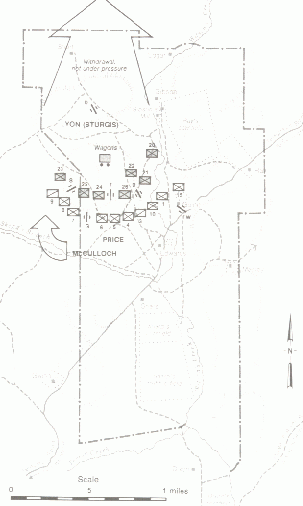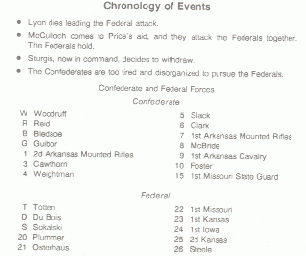| |
|
|
|
Union
Army Retreats
| Timeline |
11:30
am |
Union
forces retreat from battlefield |
|
|
|
 |
|

Courtesy
"The Wilson's Creek Staff Ride and Battlefield Tour" by Major George Knapp
and published by Combat
Studies Institute. The US Army and the National Guard use battlefields
like Wilson's Creek to assist in teaching military history to its
officers. |
|
 Dubois Dubois
Captain
Granger now proposed to me to take my infantry, and with a section of artillery
to advance. The men were cheering for victory.
 Sturgis Sturgis
Captain
Granger, acting assistant Adjutant-General on my staff...Now sighting a gun
of Dubois' battery, and before the smoke had cleared away sighting one of
Totten's; at one moment reconnoitering the enemy, and the next either bringing
up re-enforcements or rallying some broken line.
 Dubois Dubois
...Sturgis
came up and ordered me to take position about four hundred yards in rear
and protect a retreat. I was never so astonished in my life.

 "M"
Under Letter by Kansas Troops
"M"
Under Letter by Kansas Troops
We left
slowly, followed by the artillery, and soon were off the field. As we were
leaving, a shell thrown by the enemy fell and burst near us, killing our
third lieutenant, Robert Newell, from Oskaloosa. He was struck on the back
of the head, and killed instantly.
 New York Tribune New York Tribune
....They
assembled in large numbers, and, raising their traitorous banner, made an
effect at cheering.
 |
John
Elisha Phelps
son of
John S and Mary Phelps |
photo
courtesy of Wilson's Creek National Battlefield
 New York Tribune New York Tribune
I had
not proceeded far on the eastern side of the creek when I met the son of
the hon. John S Phelps, who had left town upon hearing the cannonading, with
a few mounted Kansas troops, and not discerning the exact position of the
two armies, had busied himself taking prisoners on the Fayetteville road
and west of it. When I met him he had captured half a dozen, including a
negro belonging to an officer in a Louisiana regiment. Placing them upon
the trail for our guards, and in charge of the Kansan's, Phelps and myself
proceeded but found it unsafe to attempt to cross the Fayetteville road,
and seeing the army retreating, we joined them and continued to the
city.
 Spfld Leader Dockery Spfld Leader Dockery
With
his life blood slowly ebbing away, Weightman noted that the firing had ceased
and caught the distant sound of cheering and feebly asked: "Who won?" Some
one answered, "We did," and with a smile upon his face, he passed away.
 Sturgis
Sturgis
...just
after the order to retire was given, and while it was undecided whether the
retreat should be continued, or whether we should occupy the more favorable
position of our rear, and await tidings of Col. Siegel, one of his
non-commissioned officers arrived, and reported that the colonel's brigade
had been totally routed, and all his artillery captured, Col Sigel himself
having been either killed or made prisoner. Most of our men had fired away
all their ammunition,...

 One Who Was
There One Who Was
There
Worn
down with exertion and pressed by hunger, our force is led by the heroic
major from Wilson's Creek, four miles through the timber and out upon the
prairie, where we halt and form, anticipating pursuit, though such fear was,
as it proved, groundless.
courtesy
"Embattled Arkansas
The Prairie
Grove Campaign of 1862
by Michael
E Banasik |
 |
Col
Dandridge McRae
3rd Arkansas
Inf |

 Snead
Snead
As soon
as it was known that the Union army was retreating General Price urged McCulloch
to pursue, but urged him in vain...twenty-seven hundred of their mounted
men, and two thousand of their infantry had hardly fired a shot, and Bledsoe's
and Reid's batteries were both intact.Besides these there was the Third
Louisiana, a splendid regiment, which could still muster five hundred men
flushed with their victories over both Plummer and Sigel; and there were
McRae's battalion, and O'Kane's, which, though they had been under fire,
had not been scathed. And in addition to all these there were two thousand
unarmed missourians, who could have been equipped and sent in pursuit before
sunset, for now there were arms for all, and to spare...Even the fact...that
then enemy had lost their valiant leader did not shake mcculloch's fixed
purpose. He would not pursue; but ordered the troops, instead, to care for
the wounded and bury the dead...Nothing excuses that brave soldier's conduct
on this occasion except the fact that the Confederate government was then
opposed to an aggressive war, and therefore objected to the invasion of any
state which had not seceded and joined the Confederacy. In entering Missouri
at all he had violated both the orders under which he was acting, and the
wishes of the Confederate Secretary of War...
|